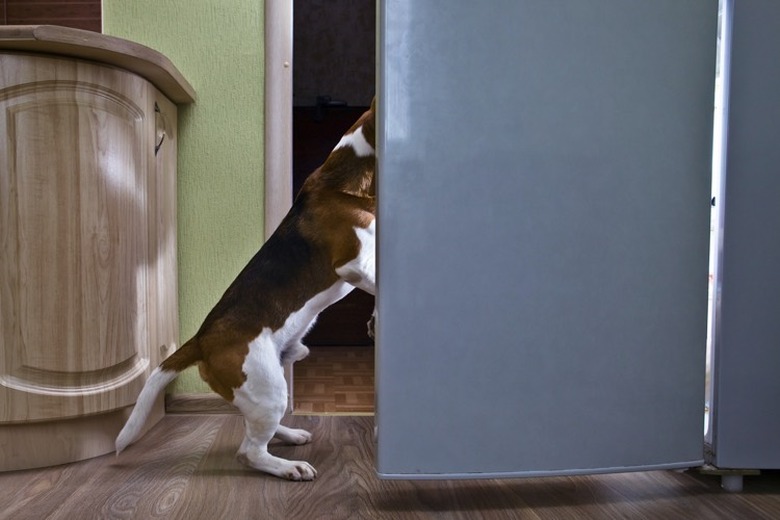7 Common Foods & Drinks Dangerous To Dogs
Everyone likes to slip their pooch a tidbit or two of human food every now and again; we're all guilty of loving our pups just a bit too much sometimes! Some foods are so dangerous, though, so they should never be considered as treats.
Alcohol
Your dog should never be given or allowed access to alcohol, which can cause low blood pressure, low body temperature and neurologic signs, among other problems. Be especially wary of unbaked desserts. Rum-soaked cake is a good example, as well as yeast-bread dough.
Raisins
Raisins may be one of the most toxic human foods a dog can eat. A very small number of raisins can kill a dog, and the smaller the dog, the more dire the threat. Merck Veterinary Manual states that .18 ounces of raisins per pound of body weight is a lethal dose. A lunchbox size pack of raisins is 2 ounces, and would be enough to endanger a 10- to 12-pound dog.
No one is sure what the toxic compound in raisins actually is. While there's been a lot of research conducted, no conclusion has been reached. What is known, though, is that raisins cause very quick kidney failure. Progression typically happens within one to three days, and early symptoms include vomiting, diarrhea, dehydration and seizures. If your dog has been exposed to raisins, take him to the vet immediately.
Macadamia Nuts
It's hard to resist the rich, meaty, delicate flavor of a macadamia nut whether you walk on two legs or four. It's very important, though, to keep your macadamia nuts and anything containing them to yourself. For your dog, ingesting these nuts can cause vomiting, weakness, tremors and hyperthermia. The symptoms usually resolve within 48 hours and typically aren't lethal, but it can be quite unpleasant for your dog. Just to be safe, your dog should be taken to the vet for monitoring if he's helped himself to something containing macadamia nuts.
Caffeine
Any drink or food high in caffeine can be quite dangerous for your pup. Just like in humans (and more so in dogs) it overstimulates the central nervous and circulatory systems. It can overtax the heart and, depending on the amount your dog consumed, can cause death. Tremors, rapid heartbeat and unsteadiness are signs of caffeine consumption.
Onions
Onions can cause anemia in your dog when they're ingested over a period of time or in large amounts. While anemia may not sound all that serious, it quickly becomes so when you consider the fact that anemic cells cannot carry oxygen all that well and your highly-active pup may collapse without warning while exercising, walking or simply being. If your dog eats onions, take him to the vet; he'll likely need stabilizing treatment, up to and possibly including a blood transfusion.
Chocolate
While it takes a huge amount of chocolate to be lethal, smaller amounts can make your dog quite sick. Vomiting, diarrhea, panting, abnormal heart rhythm, tremors, seizures and hyperactivity are signs that your pup has helped themselves to chocolate. Severity of the symptoms varies with the amount of chocolate your dog has eaten. White chocolate is the least dangerous and dark baking chocolate is the most dangerous, due to the amount of toxins they contain.
Foods/Drinks Containing Xylitol
Xylitol is a sugar-alcohol used to sweeten foods (typically chewing gum, sugar-free sweets, diet drinks, and other foods labeled "sugar free") and can cause hypoglycemia and serious liver damage in dogs and cats, even in small quantities. Hypoglycemia, or decreased blood sugar, can occur if your dog ingests more than 35 milligrams of xylitol per pound of body weight. Liver damage occurs if your dog eats more than 227 milligrams per pound. That may make it seem like a dog would need to eat a lot, but a stick of sugar-free gum can contain up to 0.4 gram of xylitol in it. This means that if your dog is a tiny breed like a Yorkie, less than two sticks of gum could trigger hypoglycemia. It is extremely important for you to check ingredient labels carefully, and keep anything containing xylitol away from your pets.
By Kea Grace
—
References
VCA Animal Hospitals: Grape and Raisin Toxity
Merck Veterinary Manual: Macadamia Nuts
Dr. Sophia Yin: Onions and Dogs
ASPCA: People Foods to Avoid Feeding Your Pets
NBC News: People Foods That Can Kill Your Pet
About the Author
Since 2001, Kea Grace has published in "Dog Fancy," "Clean Run," "Front and Finish" and an international Czechoslovakian agility enthusiast magazine. Grace is the head trainer for Gimme Grace Dog Training and holds her CPDT-KA and CTDI certifications. She is a member of the APDT and is a recognized CLASS instructor. She's seeking German certification from the Goethe Institut.
